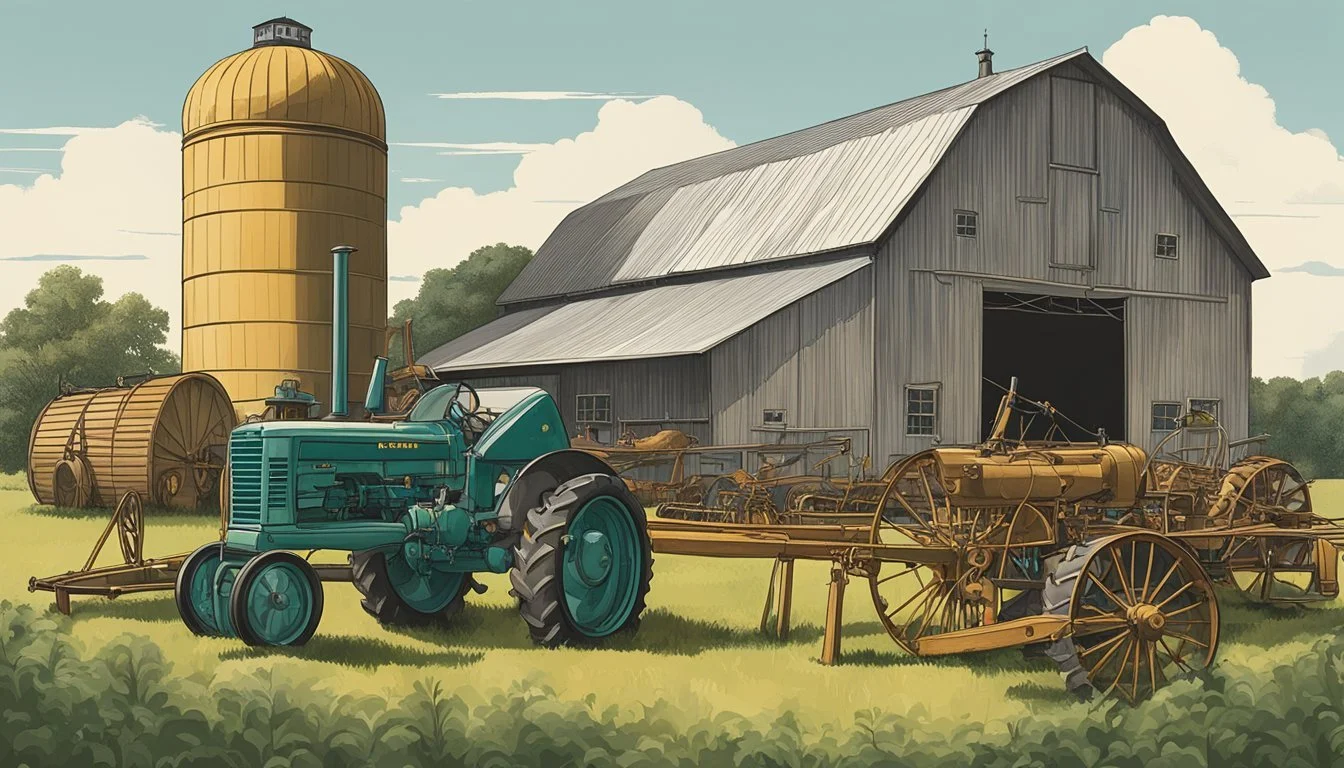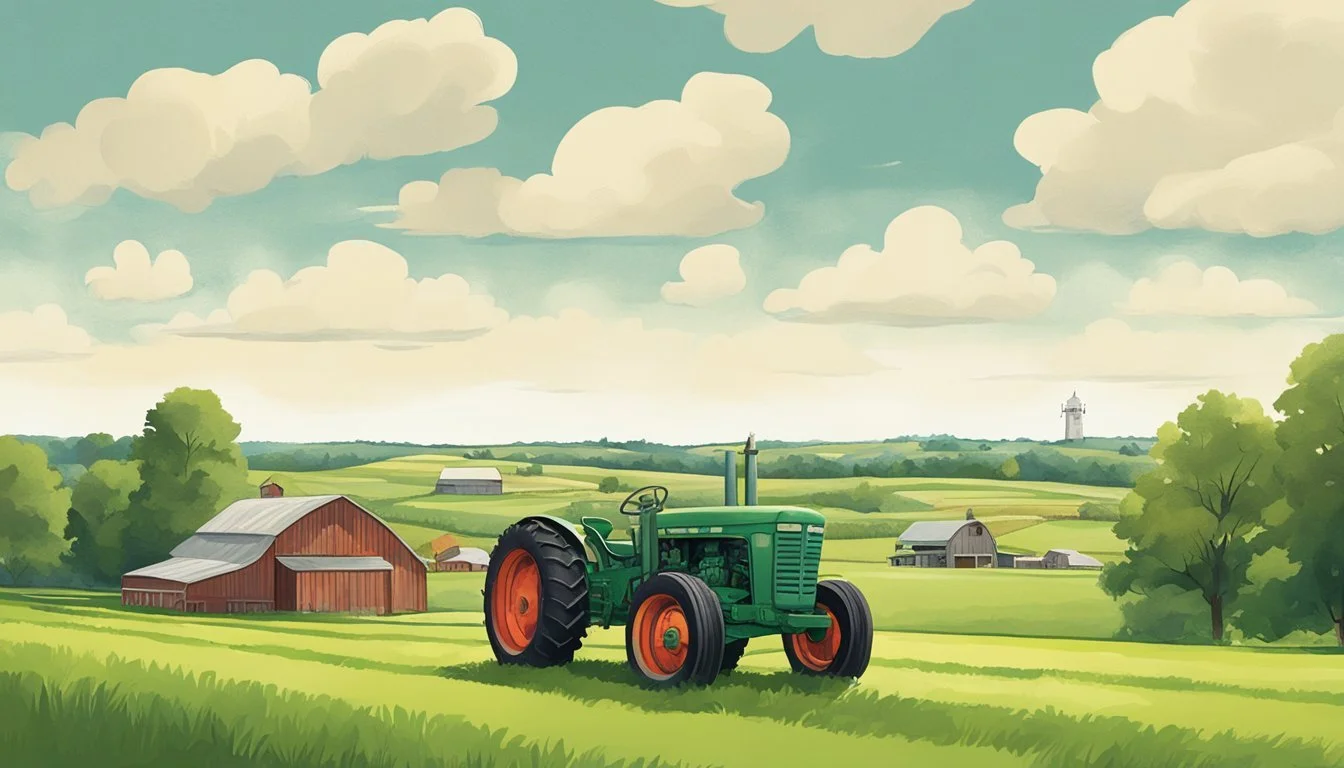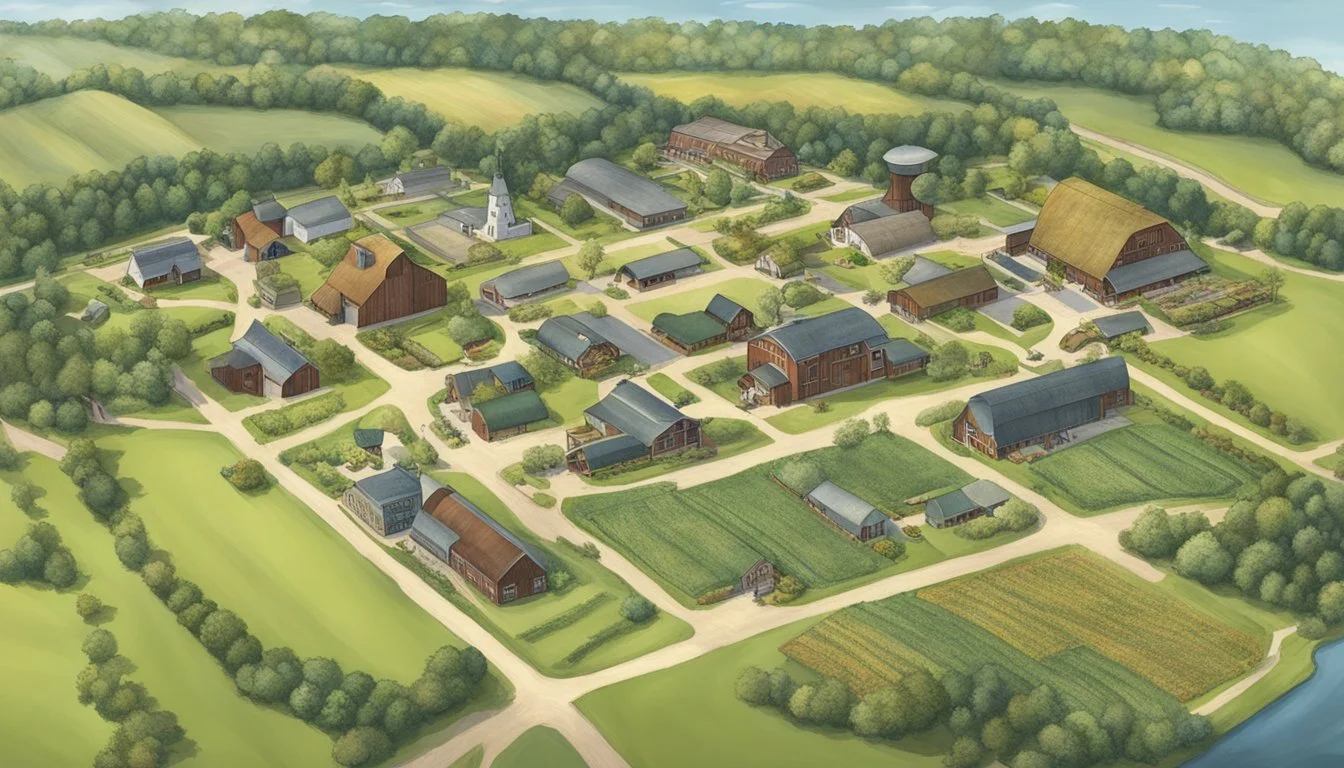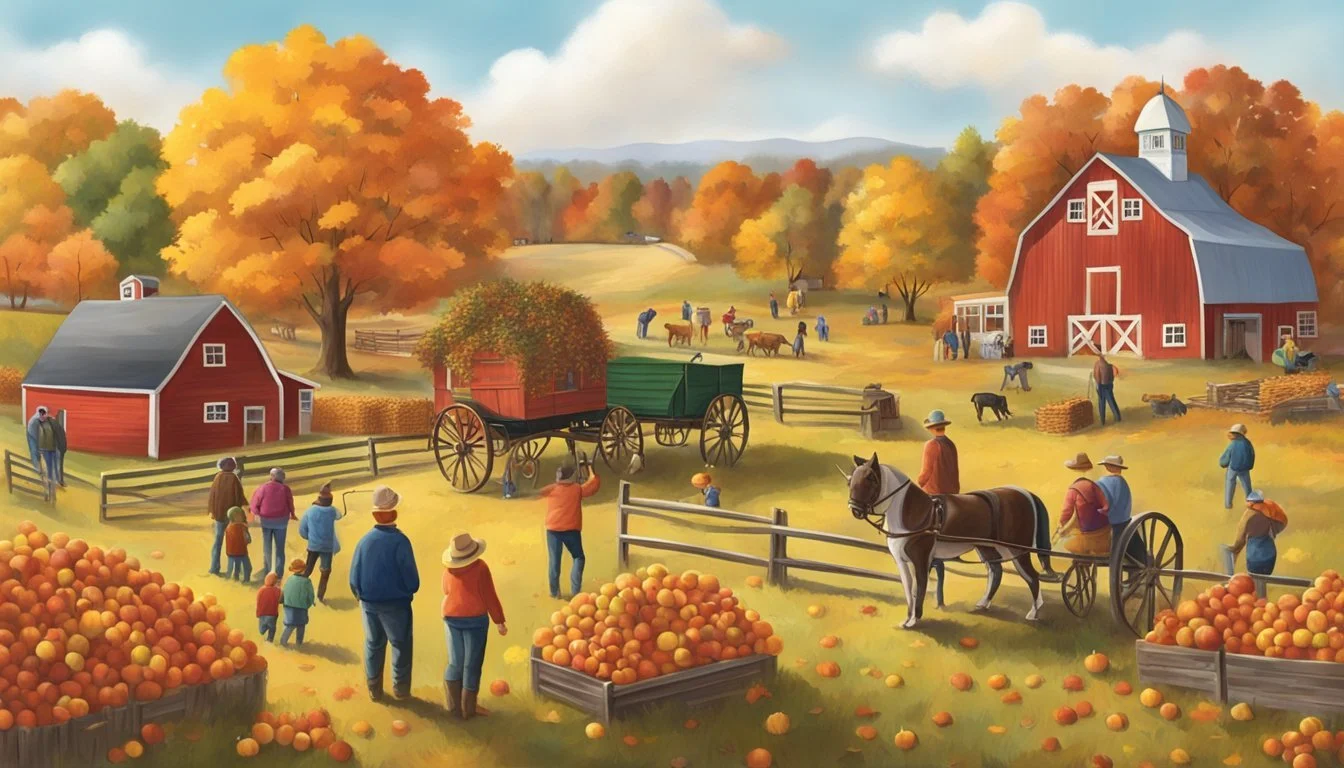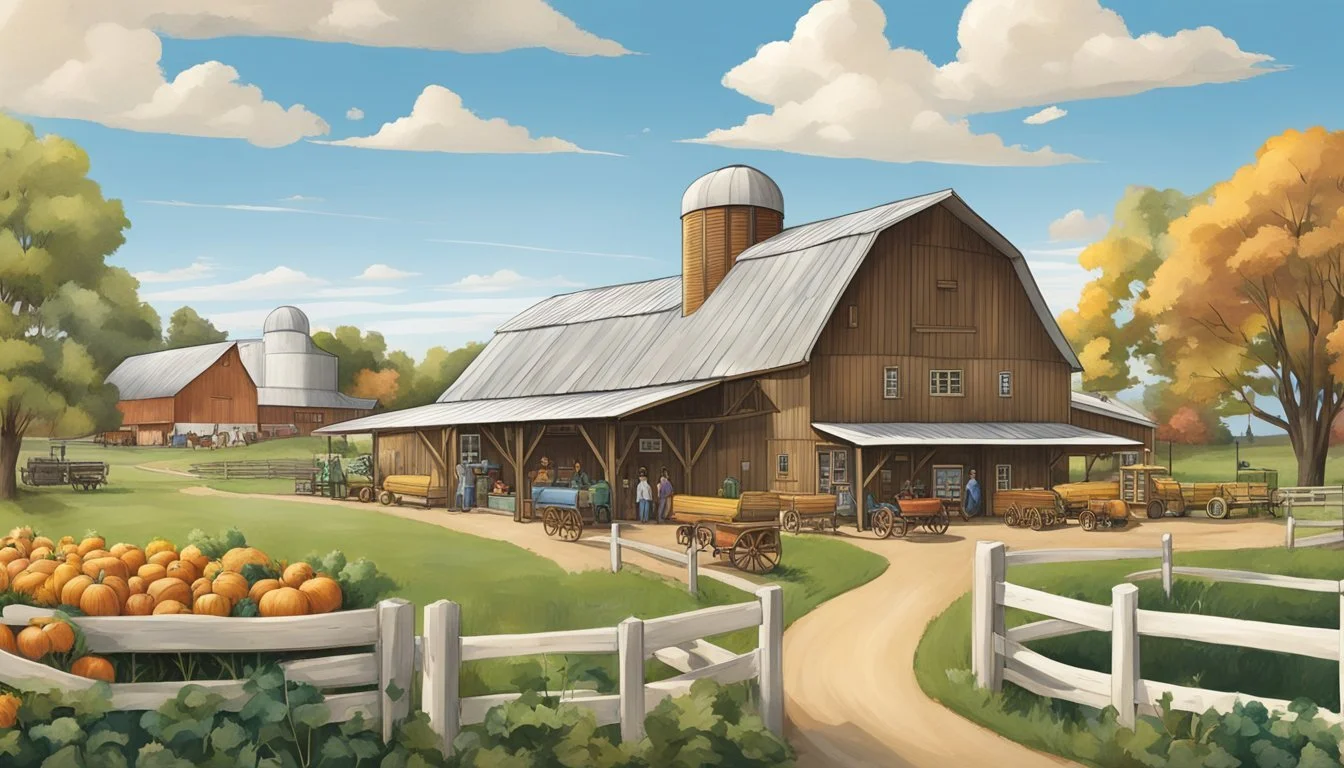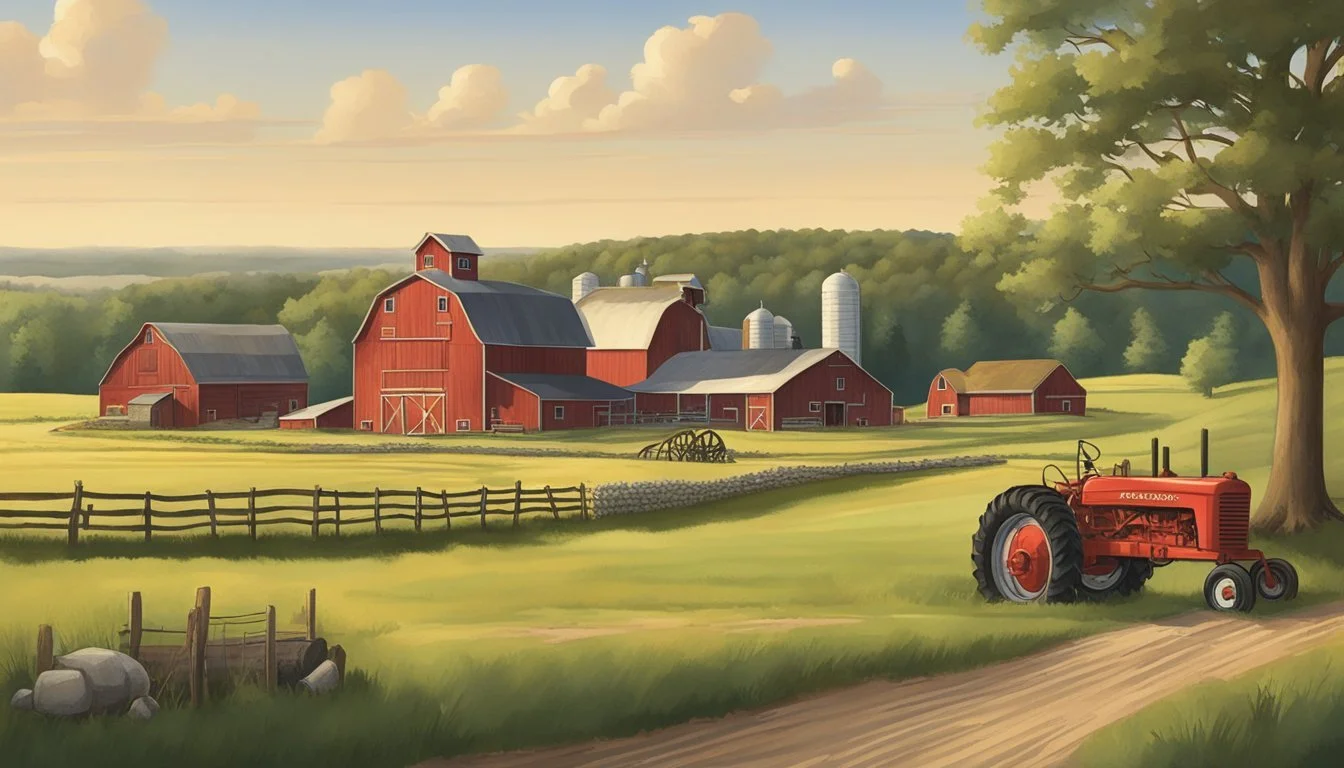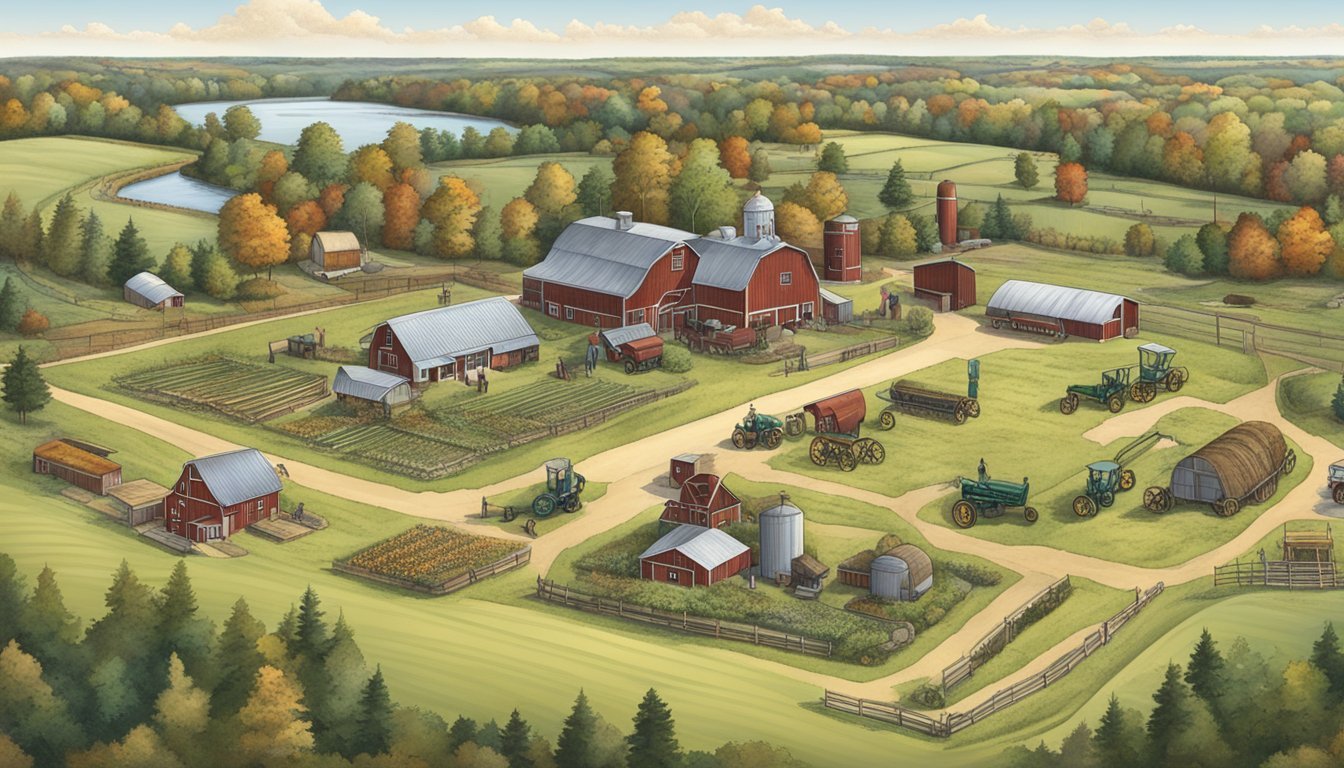Historical Farms and Agricultural Museums in Michigan
A Guide to Rustic Heritage Sites
Michigan's rich agricultural heritage is preserved and celebrated in various historical farms and agricultural museums across the state. These institutions are vital in providing insights into the rural life and farming practices that have shaped the region over the centuries. They offer an immersive glimpse into the past, with many featuring restored farmhouses, authentic agricultural implements, and living history presentations that bring the farming traditions of yesteryear to life for visitors of all ages.
The importance of these sites cannot be overstated, as they serve not only as educational resources but also as cultural touchstones that connect present Michiganders to the pioneering spirit of their ancestors. At places like the Cobblestone Farm Museum, one can experience the restored mid-19th century farmhouse and explore the lifestyle of early Ann Arbor settlers. Similarly, the Waterloo Farm Museum provides a unique view of 1880s farm life with its original buildings, including a rare wooden windmill and a log house with a stone fireplace.
Through programs and exhibits, these museums also address the evolution of farming techniques, highlighting the innovation and resilience of the agricultural community in Michigan. Whether it's learning about the Centennial Farm Program that recognizes farms operating for over 100 years or participating in hands-on activities, visitors gain an appreciation for the state's enduring connection to its agrarian roots.
Historical Importance of Farms in Michigan
Farms have been a cornerstone in Michigan's development, playing a significant role in both its local and national economic standing. From the early 19th century, agriculture has been a driving force in the state's growth.
Development of Agriculture in the State
Insightful analysis marks Michigan's ascent in agricultural prominence since the early 19th century. In southern Michigan, pioneers discovered prairies well-suited for wheat, leading to it being a principal cash product for the state. Expansive growth was seen between 1820 and 1834 with a tenfold population increase, predominantly due to the surging agricultural prospects. The cultivation of expansive wheat fields symbolized the settlers' adaptation to the region's fertile lands and contributed to Michigan's budding agricultural history.
Impact on Local and National Economy
Agricultural prosperity in Michigan translated into substantial economic impact, both locally and nationally. With history indicating that wheat and wool evolved as major cash contributors for Michigan, these commodities helped cement the state's role in feeding the nation and supporting the textile industry. The establishment of the Michigan Centennial Farm Program recognizes the enduring legacy of family farms that have surpassed a century of operation, underscoring the continuity and economic importance of these agricultural enterprises within MI.
Overview of Agricultural Museums in Michigan
Michigan's agricultural museums play a pivotal role in preserving the state's rich farming heritage. They house extensive collections and operate under organizations such as the ALHFAM, ensuring the continuity and accessibility of agricultural history.
Roles and Contributions
Agricultural museums in Michigan, such as the Coopersville Farm Museum, demonstrate significant roles in conserving, displaying, and interpreting historical artifacts and information related to the state’s farming past. These entities contribute to public education by offering a tangible connection to agricultural techniques and lifestyles that shaped the region. They typically house a diverse collection of farm implements, machinery, and documents that reflect the history and technological advancements of agriculture.
Association with ALHFAM
Many of these museums are associated with the Association for Living History, Farm and Agricultural Museums (ALHFAM), an organization dedicated to supporting those who preserve and interpret agricultural history. This affiliation allows Michigan's museums such as the Waterloo Farm Museum to connect with a broader network of similar institutions, gain access to specialized resources, share knowledge, and participate in professional development opportunities focused on agricultural history and living history farms.
Living History and Reenactments
Living history and reenactments play a crucial role in preserving and demonstrating Michigan's rich agricultural past. Museums throughout the state offer immersive experiences that highlight the pioneer lifestyle, featuring interactive exhibits and hands-on activities that bring historical farming practices to life.
Interactive Exhibits
At living history museums across Michigan, visitors engage with interactive exhibits that involve them directly in the agricultural experiences of the past. These exhibits often include authentic farm implements and tools, providing a tangible connection to Michigan's agricultural heritage. Visitors can explore traditional farming techniques, learn about the crops and livestock specific to different eras, and even participate in seasonal events organized by these museums.
Pioneer Lifestyle Demonstrations
Pioneer lifestyle demonstrations give a vivid glimpse into the daily lives of early Michigan settlers. These demonstrations include activities such as blacksmithing, weaving, and candle making, conducted by experts dressed in period attire. The living history museums not only showcase these skills but also explain their significance in the context of pioneer survival and economy. Attendees at these events witness firsthand how early inhabitants of Michigan farmed, cooked, and crafted, fostering a deeper appreciation for the state’s formative years.
Seasonal Events and Activities
Michigan's historical farms and agricultural museums offer a rich tapestry of seasonal events and activities that cater to all ages, immersing visitors in the state's agricultural heritage. These venues provide hands-on experiences through spring plantings, summer tours, harvest festivals, and winter celebrations.
Spring Planting
In spring, farms across Michigan burst into activity. Visitors can participate in Spring Planting days, where they learn about traditional farming techniques and the importance of planting crops in harmony with the season. The hands-on experience is educational for children and adults alike, offering a deeper understanding of where food comes from.
Events: Seed planting demonstrations, heirloom varieties showcase
Activities: Interactive farm tours, hands-on gardening
Harvest Festivals
As the air turns crisp and the leaves adopt their autumnal hues, Michigan's farms celebrate the season's bounty with Harvest Festivals. These festivals, often held in September and October, feature corn mazes, hayrides, pumpkin picking, and an array of local produce. They provide a perfect opportunity for families to enjoy fall's splendor and learn about harvest techniques.
Events: Live music, craft markets
Activities: Cider pressing, pumpkin carving, corn mazes
Winter Celebrations
During the winter months, despite the cold, farms and museums in Michigan don the festive spirit with holiday-themed Winter Celebrations. These celebrations might include historical reenactments of 19th-century farm life and traditional cooking methods. Some events commence as early as November, welcoming the winter holiday season.
Events: Historical tours, traditional holiday décor workshops
Activities: Storytelling by the hearth, horse-drawn sleigh rides
Educational Programs and Tours
Educational programs and tours at Michigan's historical farms and agricultural museums provide a rich, hands-on learning experience for all ages. They are designed to offer insights into the state's agricultural heritage, with a focus on interactive learning.
School Group Visits
School group visits are tailored to enhance classroom learning with real-world experiences. For example, the Coopersville Farm Museum offers educational exhibits that bring to life farming and rural traditions "Then & Now," perfect for students to see the evolution of agriculture. Another destination, the American Farm Museum & Education Center, aims to preserve agricultural history while teaching about the future of farming, thereby enriching the curriculum for visiting school members.
Guided Tour Options
Guided tours at these sites are led by knowledgeable staff who provide detailed narratives about the exhibits and farm life. The Cobblestone Farm Museum invites visitors to discover early settler life, offering guided tours that reflect the mid-19th century rural life in Washtenaw County. Another engaging experience can be found during events like Pioneer Day at the Waterloo Farm Museum, which includes demonstrations and tours bringing the late 19th century farm life to visitors, making it an ideal educational outing for families and history enthusiasts.
Community Involvement and Support
Historical farms and agricultural museums in Michigan thrive through the active participation and backing of their communities. They depend on the support of locals and history enthusiasts to preserve and share the state's rich farming heritage.
Volunteer Opportunities
Historical Society of Michigan's Centennial Farms Program relies heavily on volunteers who help in preserving farms that are a century old or older. Prospective volunteers can engage in various activities, ranging from event planning to farm maintenance. By offering their time, individuals not only contribute to preserving Michigan's farming past but also gain valuable knowledge and experience in historical preservation.
Membership and Sponsorship
Membership is a vital support system for organizations like the Coopersville Farm Museum, providing them with a steady foundation of support. Individuals can become members to actively partake in sustaining the museum's mission. Moreover, sponsorship from local businesses and patrons enhances these institutions' ability to host events, expand exhibitions, and conduct educational programs. Sponsorship opportunities are available in different tiers, each providing unique benefits and recognition suitable for a diverse range of contributors.
Architectural Highlights
Michigan's historical farms provide a window into the past with their well-preserved architecture. These structures offer a tangible connection to the agricultural history and evolution of the region.
Historical Farm Houses
Historical farmhouses across Michigan reflect the state's rich settlement history. Many of these homes, dating back to the early 19th century, feature structures built with log cabins that are often distinguished by their simple, yet sturdy, construction. Often, these log cabin structures, with their significant historical value, are preserved within farm museums to showcase the living conditions of Michigan's early settlers.
Unique Barn Constructions
The variety of barn constructions found in Michigan serve as a study in American agricultural architecture. From the stone walls of fieldstone barns to the distinctive Romanesque revival elements that appear in certain designs, each structure stands as a testament to the era and the builders' expertise. The barns' Gothic, gambrel, and gable roofs are more than functional; they contribute to the character of Michigan's agricultural landscape, with each design element, including hay hoods, cupolas, and dormers, marking different periods and styles of barn-building traditions.
Special Exhibits and Collections
Michigan's historical farms and agricultural museums are treasures that preserve the state's rich agrarian past. Visitors can explore an extensive collection of artifacts and enjoy thematic exhibits that highlight the unique nexus between art and agriculture.
Artifacts and Tools Display
At agricultural museums such as the Coopersville Farm Museum, one will find a vibrant collection of historical artifacts that provide insight into the farm life of yesteryears. From turn-of-the-century hand tools to antique tractors, each item within the collection tells a story of rural Michigan. Curated with great care, these artifacts offer a tangible connection to the practices and innovations that shaped the landscape of Muskegon and surrounding regions.
Artists and Trains Exhibits
Exhibits at farm museums not only showcase the history of agriculture but also display the works of local artists who draw inspiration from Michigan's pastoral sceneries. The depiction of historical trains in these exhibits connects visitors with the transformative role railroads played in the distribution of agricultural goods. At the Coopersville Farm Museum, the Artists and Trains exhibit merges locomotive artistry with agricultural heritage, providing a multifaceted cultural experience.
Visitor Information
When planning to visit historical farms and agricultural museums in Michigan, visitors can expect a range of amenities and accessible options. Each location offers unique experiences with the convenience of modern facilities.
Accessibility and Travel
Visitors will find that locations like the Coopersville Farm Museum are tailored to be barrier-free, ensuring that guests with mobility challenges can enjoy the museum comfortably. Public transportation options are available across Michigan, with Ann Arbor as a prominent hub for those traveling by bus or train. Farms that are open year-round provide ample opportunity for visitors to explore during any season, though it's wise to check each farm's specific hours which may vary.
Gift Shop and Amenities
Gift shops at these historical sites often reflect the rich agricultural heritage, presenting a selection of local crafts, books, and produce. For example, the American Farm Museum & Education Center will feature a gift shop that celebrates local agricultural history and community. Amenities such as restrooms and on-site parking are standard, offering visitors the comfort and convenience they need during their educational exploration.
Preservation and Recognition
Historical farms and agricultural museums in Michigan are not only windows to the past, but they are also actively preserved and recognized for their cultural importance. These entities are integral to local and state history, embodying agricultural practices and lifestyles of eras gone by.
Listing as Historical Sites
Many Michigan farms have been officially listed as historical sites, providing them public distinction and recognition. For instance, the Michigan Centennial Farms Program acknowledges farms that have been continuously owned by the same family for at least 100 years, marking them as state treasures. This recognition by the state highlights the farm's endurance and contribution to Michigan's agricultural legacy.
Efforts in Conservation
There is a concerted effort within Michigan to conserve historical agricultural sites. Organizations such as the Michigan Barn Preservation Network underscore the significance of barns as agricultural icons by promoting their restoration. Nationally, Michigan's living historical farms have gained attention through exhibits like Barn Again! which was a project of the National Trust for Historic Preservation to celebrate and raise awareness about barn conservation. Additionally, resources provided by associations like ALHFAM (Association for Living History, Farm and Agricultural Museums) offer vital support for the professionals involved in these conservation endeavors, ensuring that both national and local history are preserved through living history farms.
Getting Involved
Engaging with Michigan's rich agricultural history can be a rewarding endeavor. Opportunities abound for individuals to support and participate in various events and initiatives that celebrate the state's historical farms and agricultural museums.
How to Support
Volunteering: Individuals can contribute their time as volunteer hosts at historical sites like the Hartwick Pines Memorial Building. Volunteering often includes presenting programs and leading tours, and may come with perks such as free camping. More information on volunteer opportunities is available on the State of Michigan website.
Donations: Financial contributions and donations of materials or artifacts can significantly aid the preservation and educational missions of historical societies and museums. For instance, those looking to donate can consider the various types of contributions welcomed by the Historical Society of Michigan.
Upcoming Events and News
Michigan Centennial Farms Program: Families can apply for recognition of their farm's longstanding heritage through the Centennial, Sesquicentennial, and Bicentennial Farm Program. Details on eligibility and the application process can be found on the Historical Society of Michigan's website.
Living History Conferences: The Association for Living History, Farm and Agricultural Museums (ALHFAM) frequently hosts events that highlight living history techniques in museum programs. Keep abreast of the latest gatherings and workshops on the ALHFAM website.
Local Historical Society Meetings: Community members are encouraged to attend meetings of historical societies such as the Homer Historical Society, which aims to preserve local history and conduct educational programs. Upcoming meetings and events can be checked on their website.
By actively supporting these initiatives, individuals help ensure the legacy of Michigan's agricultural history is preserved and celebrated for future generations.
Local Lore and Folklife
Historical farms and agricultural museums in Michigan provide a rich canvas on which the colorful tapestry of local lore and folklife is painted. Here, stories rooted in the community offer insight into the state's cultural heritage.
Tales from Northern Michigan
Northern Michigan is a land steeped in stories, where winters are long, and the traditions run deep. Residents celebrate the past through tales that often weave the rugged landscape with human perseverance. The legends may range from maritime mysteries to tales of the lumberjacks that once ruled these woods.
Agricultural Traditions
They have preserved rich agricultural traditions in Michigan's historical farms and museums, reflecting a long-standing bond with the land. These traditions are not just about farming techniques; they are a testament to the United States' community spirit and work ethic. Festivals, harvest celebrations, and demonstrations at places like the Cobblestone Farm Museum bring to life the customs that have shaped local history and continue to influence community identity.

